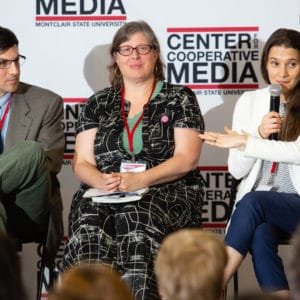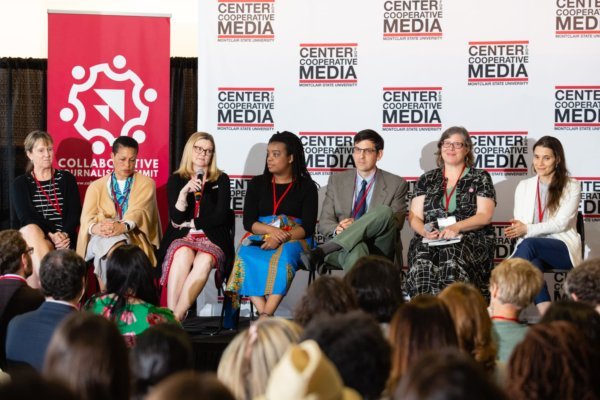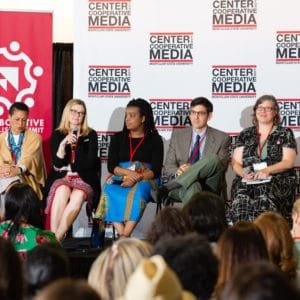‘Time, money, and pain’ make collaborative projects work
The third annual Collaborative Journalism Summit started with one message: Collaboration works. Then came the caveats that these types of collaborative projects require time, trust, clearing houses and connectors.
The summit, staged in Philadelphia for the first time and with an opening panel of speakers all based in the city, ranged from non-profit to for-profit media, tiny shoestring operations and large established media. The panelists were all grappling with changing markets, frequently challenged by scant resources and sometimes by shrinking audiences.
“The community is best served by media connected to the community,” began panel host Manuel Smith, president of the Philadelphia Association of Black Journalists and an assignment editor at NBC10.
Cooperation can be a key element to connecting media to many communities, added Smith. His organization was a sponsor of the summit.
Panelists acknowledged the catalyst role of the summit itself, organized by the Center for Cooperative Media at Montclair State University in New Jersey.
Everyone acknowledged fellow panelist Jean Friedman-Rudovsky, a freelance journalist and a co-executive director of the organization Resolve Philadelphia, as key to locally making cooperation a working reality in the city.
Friedman-Rudovsky said valuing each contributors’ equity in projects, rather than trying to enforce equality, is where she begins. Through Resolve, she is currently editing the Broke in Philly collaborative reporting project, which tells stories of poverty in terms of problems and solutions, rather than as an abstract issue.

Jean Friedman-Rudovksy of Resolve Philly (right), sits with Gene Sonn of WHYY (left) and Gretjen Clausing of PhillyCAM (center) on the first keynote panel at the 2019 Collaborative Journalism Summit in Philadelphia. Photo by Leslie Barbaro.
Friedman-Rudovsky, humbled by the recognition of her peers, said the acknowledgment that cooperative projects are “increasing the audience for everyone,” has built acceptance of Broke in Philly, with 19 local news organizations sharing the storytelling.
Her independence and allegiance to the stories, rather than any one news organization, has built trust and acceptance, key elements to fostering cooperative journalism across outlets, she added afterward.
Gene Sonn, the audio news director of WHYY, a large public radio station in Philadelphia, said framing Broke in Philly stories “in a relatable way,” made the project work for everyone across audiences and platforms.
Journalism’s traditional frame of stories about “issues” doesn’t work across all media or resonate with all audiences, he explained. Sonn also said cooperative stories act as “a force multiplier.” That means expanding audiences while also allowing media organizations to learn from each other’s strengths, he added.
Sara Lomax Reese, the president of WURD, a Philadelphia radio station, said cooperation is simply “survival strategy.” Reese is a board member of the Lenfest Institute for Journalism, one of the summit’s financial supporters and also a supporter of Resolve.
Reese added telling the stories central to her largely black and urban radio listeners means sharing “just who we are” to the rest of the “ecosystem” of news outlets across the city.
“Either we sink, or we all rise together,” and that’s the new business reality for the media, Reese said to the nods of her colleagues.
Cooperation means “a shared workload, and “a louder microphone,” said Wendy Warren, director, integrated media, NBC10 Philadelphia.
But she cautioned that it has taken time to “throw out traditional measurements of journalism,” which are largely built on competitiveness.
Michelle Bjork, deputy managing editor of operations for the Philadelphia Inquirer, said cooperation across outlets has meant opening her legacy media news operation to a different audience. That approach has also meant “reporting a better story” Bjork added. The Inquirer hosted the kick-off event in its Center City offices.
For the community media center PhillyCAM’s Gretjen Clausing, cooperation has meant building a natural connection to larger organizations such as the Inquirer and its resources.
The Inquirer has in turn benefitted by having access to PhillyCam’s taped video profiles of all 30 candidates in one Philadelphia city election contest, added Bjork.
So, what’s required to make cooperation work?
“Time, money and pain,” summed up Cheryl Thompson-Morton, an analyst for Lenfest, said to the laughter and ascent of other panelists.
_____________
Kevin C. Shelly is a writer, editor, and reporter based in New Jersey. You can find him on Twitter at @kcshlly or contact him at [email protected].


